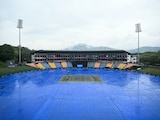MK Stalin appearing before the four-member selection panel.
Chennai:
As the marathon 11-day interview to pick DMK candidates for the coming assembly polls ended on Tuesday, the party released a surprise video clip on the Kalaignar television channel.
The minute-long clip showed MK Stalin -- political heir to party chief M Karunanidhi -- appearing before the four-member selection panel headed by his father.
Stalin wants a second term from Chennai's Kolathur, a constituency nobody else has applied for.
The interviewers, though, appeared shy. Despite repeated promptings by other panelists, Karunanidhi and his second in command General Secretary Anbazhagan refused to ask Stalin any question.
Of the standard questions to all candidates, the clip showed Mr Stalin facing only one. "You want to contest again? How are your chances of victory?" senior party leader Durai Murugan asked.
"I'd like to contest there if party allows. I have good chances of victory," Stalin is heard saying.
He was spared the toughest question: How much money he would spend for his campaign. The answer is "Around Rs 2 crore" - an usual amount in a state where distributing gifts and on occasion, cash, to voters is par.
Instead, a tweaked version came from Durai Murugan. "They say it takes a lot of money for campaigning. How would you manage?"
"From the beginning I don't spend money," Stalin replied.
In a politically fluid situation where the DMK hopes to gain traction in the coming assembly polls, the selection of candidates has been a key process. The marathon interview process had involved tough questions on funding, local issues and caste equations. The 92-year-old Mr Karunanidhi had insisted on attending every session.
Tamil Nadu goes for polls on May 16. The party has revived ties with the Congress and is desperately trying to rope in Actor Vijayakant's DMDK.
The minute-long clip showed MK Stalin -- political heir to party chief M Karunanidhi -- appearing before the four-member selection panel headed by his father.
Stalin wants a second term from Chennai's Kolathur, a constituency nobody else has applied for.
The interviewers, though, appeared shy. Despite repeated promptings by other panelists, Karunanidhi and his second in command General Secretary Anbazhagan refused to ask Stalin any question.
Of the standard questions to all candidates, the clip showed Mr Stalin facing only one. "You want to contest again? How are your chances of victory?" senior party leader Durai Murugan asked.
"I'd like to contest there if party allows. I have good chances of victory," Stalin is heard saying.
He was spared the toughest question: How much money he would spend for his campaign. The answer is "Around Rs 2 crore" - an usual amount in a state where distributing gifts and on occasion, cash, to voters is par.
Instead, a tweaked version came from Durai Murugan. "They say it takes a lot of money for campaigning. How would you manage?"
"From the beginning I don't spend money," Stalin replied.
In a politically fluid situation where the DMK hopes to gain traction in the coming assembly polls, the selection of candidates has been a key process. The marathon interview process had involved tough questions on funding, local issues and caste equations. The 92-year-old Mr Karunanidhi had insisted on attending every session.
Tamil Nadu goes for polls on May 16. The party has revived ties with the Congress and is desperately trying to rope in Actor Vijayakant's DMDK.















